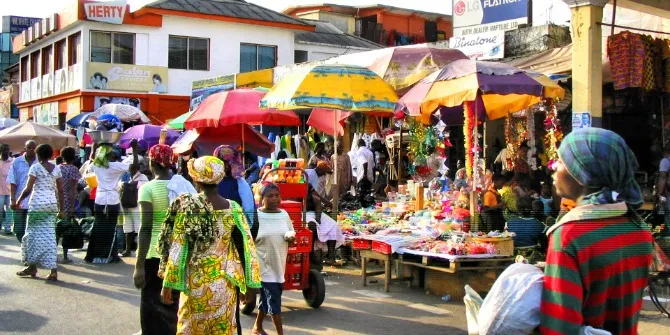Findings from the 2021 Population and Housing Census indicate that there are 11,717 internally displaced persons (IDPs) in Ghana. The reasons for internal displacement are socio-political[1] factors (55.2% of IDPs) or natural disaster[2] (44.8% of IDPs). One in every ten (10.7%) of the IDPs have stayed less than one year in their current place of residence, with six in ten (60.8%) having been displaced for 5 years or more.
More than half of (57.3%) of IDPs reside in four regions: the Greater Accra (19.2%), Northern (14.1%) Ashanti (13.7%) and Central (10.2%) Regions.
The adult illiteracy rate for IDPs is twice that of persons who are not displaced: four in every ten (41.3%) IDPs aged 15 years and older are not literate compared to two in every ten (21.9%) non-IDPs. The percent of children aged 4 to 17 years who have never been to school is three times higher for IDPs (15.2%) than non- IDPs (4.8%).
The census also provides statistics on international migrants in Ghana. The leading drivers of immigration to Ghana is employment (36.9%), settlement (22.7%) and marriage or family unification (25.0%). For males, getting employment (49.8%) is the most frequent purpose for migration, while for females it is migration for marriage or family unification (46.9%). A greater share of migrants is male (60.5%) compared to females (39.5%).
Almost half (48.3%) of international migrants have lived in Ghana for five years or more.
These statistics were released on International Migrants Day, which is commemorated annually on 18th December to highlight the contribution of migrants and the challenges they face.
About Ghana Statistical Services
Ghana Statistical Services (GSS) provides comprehensive, reliable, quality, relevant, accurate and timely statistical information to guide national development as stipulated in Section 3 of the Statistical Service Act, 2019 (Act 1003). The organisation’s vision is to be a trusted provider of statistical services for good governance – its mission being the efficient production and management of quality official statistics based on international standards, using competent staff for evidence-based decision-making in support of national development.
Ghana Statistical Services produces monthly and quarterly data on important economic indicators such as Inflation, Consumer Price Index (CPI), Producer Price Index (PPI) and Gross Domestic Product (GDP). GSS also regularly generates periodic population, housing, demographic and economic data at the locality, district and national levels from routine surveys and censuses. The statistics generated by GSS can be utilised by a wide cross-section of users; including the public sector, businesses, academia, civil society organisations and development partners. For more information on the statistics generated by GSS visit www.statsghana.gov.gh.










